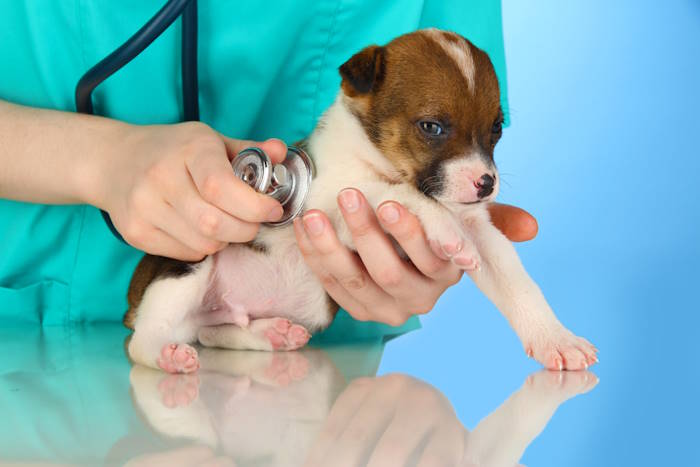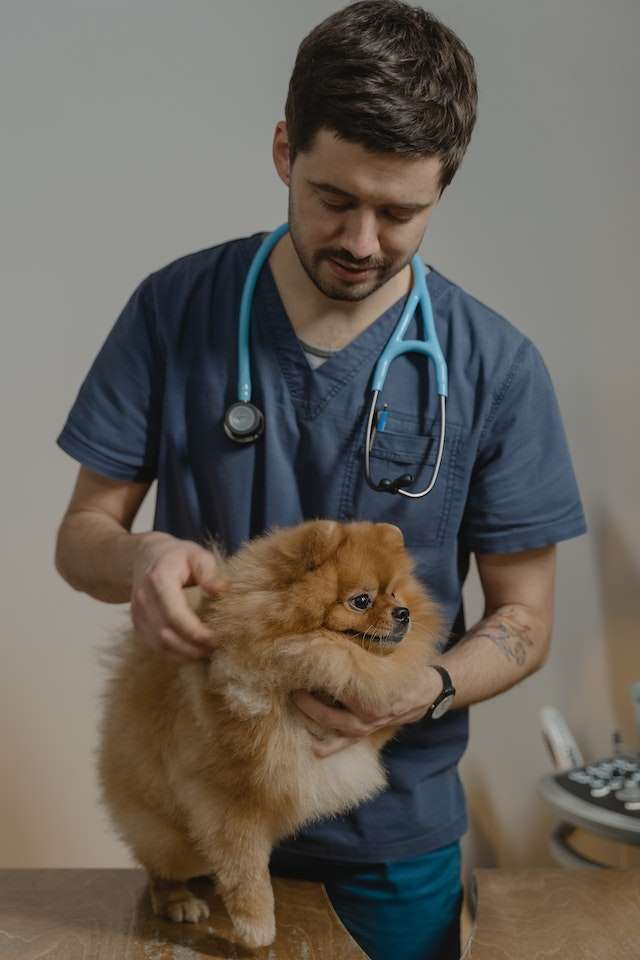- Small Dog Place Home
- Health
- Choose a Vet
How to Choose a Vet:
Ten Questions to Ask
What questions should you ask before you choose your new veterinarian?
We think there are at least ten things to consider before making that final and very important decision.
Behind every healthy small breed dog is a qualified veterinarian.
Through years of school at the undergraduate level and then through veterinary school, she or he has studied biology and nutrition, large and small animal medicine, genetics and chemistry, parasitology, hematology, surgical techniques and…
(Well the list is too long)
 Choose a Vet
Choose a VetNeedless to say, the road to being a vet is long and grueling.
But with all vets receiving similar education, how do we know how to find a vet that would be best for our little dog?
Types of Veterinarians
Beyond the obvious of choosing a small animal practitioner over a large animal vet (those that treat horses, cows, etc.) you have a few more choices to consider.
Most people need a general practitioner, a veterinarian skilled in general medicine and the one you will visit for checkups, routine tests and vaccines and when your dog gets sick.
Specialty Veterinarians
Specialty Veterinarians receive training above and beyond in a specialty area such as ophthalmology, reproductive sciences, orthopedics or cardiology.
There are as many different specialists in veterinary medicine as there are in the human arena. Normally one would contact a specialty veterinarian for help with a complex issue or a surgery not performed by your local vet.
Referrals
are made by your local veterinarian and the costs associated with specialty
vets are more. All schools of veterinary
medicines have facilities and equipment to diagnose and treat complicated
health issues.
Emergency
Emergency veterinary hospitals are those that are available around the clock and handle crisis situations such as if your dog was accidentally poisoned or struck by a car.
It’s never fun to
think about these possibilities, but knowing where the closest emergency
veterinary hospital will help put your mind at ease should the occasion arise.
So when you choose a vet, consider searching for an emergency clinic at the same time.
Holistic Verses Conventional Veterinarians
 What is the Difference Between Holistic and Conventional Veterinarians
What is the Difference Between Holistic and Conventional VeterinariansHave you considered whether you would want to work with a convention veterinarian or one who is using more holistic, alternative therapies?
Many people today are leaning towards a more holistic way of caring for their pets.
Holistic veterinary medicine uses alternative medicine methods in the treatment of pets. Their approach views the animal as a whole, and not as a group of symptoms.
The goal is to encourage health through appropriate diet, natural remedies, homeopathy treatments, nutritional supplements and acupuncture. The idea behind this approach is to help the body heal itself.
When deciding how to find a vet, you need to think about your own philosophy towards health care.
Holistic veterinarians differ in how much of their practice is devoted to treatment modalities that are considered traditional in nature verses those that are alternative.
It is important for you to feel comfortable with your choice of veterinarians. Remember, the vet needs both people skills and doggie skills.
Beyond that, the vet also needs to be a capable diagnostician, a skilled surgeon, and an expert communicator. So what are the most important questions to ask when you choose a vet?
We will assume that you have asked around, read reviews, and got the opinions of several of your friends. Now it's time to ask a few questions.
How to Choose a Vet: Ten Questions to Consider
 Questions to Ask a New Veterinarian
Questions to Ask a New VeterinarianWhat are the Hours of Operation?
Hours of Operation: Will the practice be open during times convenient to you or will you have to take off work to schedule routine check-ups.
Extended hours are more common in clinics with more than one veterinarian.
How far is the office from your Home?
How far are you willing to go? Many people will drive an hour or more to see a specific vet, but the majority of people want a veterinarian to be nearby, especially in the case of an emergency.
Did you know that the majority of dog
owners will find a vet within 5 miles of their home? In fact, many people choose a vet solely on the basis of proximity to their home.
How much do they charge?
This is tricky and often a delicate topic, but it is important to you if finances are a priority.
You should also feel comfortable with the fee schedule. Is it reasonable or do you feel the veterinarian is more interested in money than your dog.
When your dog will need a surgery or other procedure, it is worthwhile to ask for an itemized quote of charges so you can be prepared. If you are given a set fee, be sure that it covers everything.
Is there parking available?
If you live in a city, is parking available and convenient?
How Clean is the facility?
You should get a feel for the cleanliness and organization when walking through the front door. Don’t be initially impressed with high tech equipment or a room full of highly credentialed individuals. These extras may add to the cost of care.
On the other hand, a veterinary clinic that lacks basic modern medical diagnostic equipment may require you to visit a specialist for routine X-rays, ultrasound, blood work or EKGs.
What is the staff like?
How friendly and professional are they when they greet you. Do you feel they really care about you and your dog? OR, do they seem busy, unhappy, and preoccupied?
The veterinarian usually makes hiring decisions, so a friendly caring person at the front desk is a good sign.
The presence of a licensed veterinary technician is a real plus. But an overly large office staff may set up a red flag unless there are several vets working there.
Large staffs might signify crowded schedules and higher prices.
How many veterinarians practice at the facility? Will you be able to request a particular vet or see whoever is there on the day of your visit?
How competent do the support staff seem. Are they able to answer questions adequately and to your satisfaction? When you choose a vet, be sure you are also comfortable with his/her helpers.
One way to determine their level of education and competence is to ask some basic factual questions that you already know answers.
Seems a little devious, but it might shed light onto how well your dog would be cared for if admitted to the hospital.
How far in advance are appointments made?
Are they required and how far in
advance do you need to schedule them. Is there much waiting time or does
the veterinarian usually run on schedule. Choose a vet that stays on schedule. Your time is important too.
Does the vet have any special interests?
Does the vet have an area of interest such as geriatrics or pediatrics? Even if a veterinarian is not board certified in a specialty area, they might have considerable knowledge in a particular aspect that could benefit your dog.
Do they have any particular biases that affect you?
How does the vet feel about certain issues that might affect you?
Does he/she push vaccines and strict medication protocols or insist you follow a specific diet for your dog?
How about pain management? Some vets prescribe pain medications freely while others do so sparingly.
How willing are they to get to the root of the problem or do they assume you won’t want to pursue other options?
Are they an AAHA Accredited Facility
Is the clinic an American Animal Hospital Association Accredited Facility?
Only 15 percent of hospitals in the United States are accredited.
Last Words
These are just a few questions to help make that important decision about veterinary care.
No decision is written in stone, though and if the relationship does not feel right, the search for the right vet should begin again. Most people love their vets and feel very comfortable with their care.
When things do go astray, it is usually due to miscommunication or unrealistic expectations on your part.
While many of these questions can be answered by a quick phone interview, you might need to actually visit with your dog to get the best feel.
If something just doesn’t feel right after the first visit, consider resuming your search for that great vet for your little friend. It will be well worth it in the end to choose a vet that is perfect for you.
More About Janice (author and voice behind this site)
Janice Jones has lived with dogs and cats for most of her life and worked as a veterinary technician for over a decade.
She has also been a small-breed dog breeder and rescue advocate and holds academic degrees in psychology, biology, nursing, and mental health counseling.
Her work focuses on helping dog owners make informed, responsible decisions rooted in experience, education, and compassion.
When not writing, reading, or researching dog-related topics, she likes to spend time with her six Shih Tzu dogs, her husband, and her family, as well as knitting and crocheting.
She is also the voice behind Miracle Shih Tzu and Smart-Knit-Crocheting

Free Monthly Newsletter
Sign Up for Our Free Newsletter and get our Free Gift to You.
my E-book, The Top 10 Mistakes People Make When Choosing a Dog (and how to avoid them)
